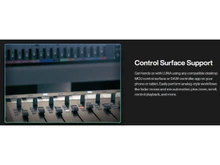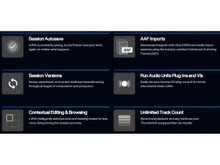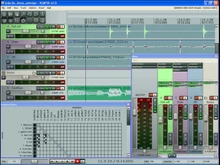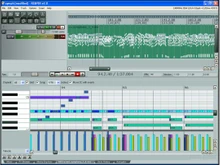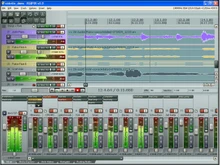Let’s have a detailed comparison of Luna DAW vs Reaper to find out which one is better. Let’s discover some of the essential factors that you must consider and decide whether Luna DAW or Reaper fits your business.
Luna Daw and Reaper: Overview
Luna, developed by Universal Audio, is a DAW that integrates deeply with UA's Apollo hardware. Released in 2020, it aims to provide a seamless music production experience with real-time tracking and an analog feel, making it popular among professional producers who appreciate high-quality sound.
Reaper, short for Rapid Environment for Audio Production, Engineering, and Recording, is a highly customizable DAW developed by Cockos. Launched in 2005, it has become renowned for its flexibility, low-cost licensing, and extensive plugin support, making it a favorite among home studio owners and professionals alike.
Luna Pros and Cons
Luna Pros:
- Modern and intuitive interface: Luna's sleek design makes it easy to navigate and use.
- Streamlined workflow: The software's focus on efficiency and automation can save time.
- Built-in virtual instruments: Luna's collection of high-quality virtual instruments provides a comprehensive sound library.
- Cloud integration: The ability to access and collaborate on projects from anywhere is convenient.
Luna Cons:
- Steeper learning curve: While the interface is intuitive, mastering all of Luna's features may take time.
- System requirements: Luna may require more powerful hardware, especially for larger projects or demanding plugins.
Reaper Pros and Cons
Reaper Pros:
- One-time purchase model: Reaper's affordable pricing makes it accessible to a wider range of users.
- Highly customizable interface: Users can tailor the interface to their preferences, improving workflow efficiency.
- Flexible workflow: Reaper's open-ended approach allows for complex routing and processing chains.
- Lower system requirements: Reaper can run on a wider range of systems, making it suitable for users with older or less powerful computers.
Reaper Cons:
- Less modern interface: Reaper's interface may feel dated compared to Luna's.
- Built-in virtual instruments: Reaper's built-in virtual instruments may not be as extensive as Luna's.
Luna Vs Reaper: Feature Comparison
Both Luna and Reaper differ from each other when it comes to hardware integration, Audio Editings, Deployment, Performance, Workflow and more. Here is a comparison of Luna DAW vs Reaper in terms of features:
Hardware Integration
Luna offers deep integration with UA Apollo hardware, making it ideal for users of UA products. It enhances workflow with low-latency real-time recording and analog summing. On the other hand, Reaper does not focus on hardware integration, but it is compatible with a wide range of audio interfaces, making it versatile for users with different setups.
Audio Editing Basics
Multitrack Editing: Both Luna and Reaper offer robust multitrack editing capabilities, allowing users to work with multiple audio tracks simultaneously.
Time Stretching and Pitch Shifting: Both platforms provide tools for time stretching and pitch shifting audio without compromising quality, useful for adjusting tempo or key.
Automation: Luna and Reaper support automation, enabling users to control parameter values over time, creating dynamic effects and transitions.
Workflow
Luna emphasizes a streamlined and efficient workflow, with features like drag-and-drop editing and intelligent automation. Reaper provides a more flexible and customizable workflow, allowing users to create complex routing and processing chains.
Performance and System Requirements
Performance: Both Luna and Reaper are known for their efficient performance, capable of handling large projects without significant lag or CPU strain.
System Requirements: Luna generally requires more powerful hardware, especially for larger projects or demanding plugins. Reaper is known for its ability to run on a wider range of systems, making it a more accessible option for users with older or less powerful computers.
Customizability
Luna’s design is streamlined and simple, which is great for ease of use, but its customization options are limited. Reaper stands out for its high level of customization. You can adjust almost every aspect of the DAW, from themes to shortcuts, allowing for a tailored user experience.
Analog Sound and Plugins
Luna is known for its analog sound emulation, Luna offers premium plugins like Neve summing and Studer tape. These features cater to users who want that classic, analog sound in their digital production. On the surface, Reaper does not come with analog-style plugins out of the box, but it supports a wide range of third-party plugins, including analog emulations, allowing users to shape their sound as desired.
MIDI Editing
Luna’s MIDI capabilities are limited compared to other DAWs, with fewer options for complex MIDI manipulation. Reaper excels in MIDI editing, offering robust tools for sequencing, composing, and automation, making it a strong choice for producers working with virtual instruments.
Reaper vs Luna: Easy of Use:
When it comes to ease of use, Luna is designed with simplicity in mind, especially for users who are already familiar with Universal Audio's hardware. The Luna Audio interface is clean and intuitive, allowing musicians and producers to dive into recording and mixing without much hassle.
On the other hand, Reaper is known for its flexibility, but this flexibility can come at the cost of ease of use, especially for beginners. Reaper offers a highly customizable interface, allowing users to tailor the DAW to their specific workflow. However, this level of customization can be overwhelming for those who are new to audio production.
Luna vs Reaper: Customer Support
Luna offers support through online guides, FAQs, and a community forum, with extra help for subscribers. Reaper relies on its active user community for support, but its developers are also responsive and often assist users directly. Both provide useful resources, but approaches differ.
Comparison Between Luna DAW and Reaper In terms of Deployment Type
While Luna DAW supports Web Based deployment; Reaper is suitable for On Premises deployment. While selecting between Luna DAW and Reaper, figure out which one of the two is compatible with your devices. This will help in reducing the hassle after implementation.
Luna DAW or Reaper: Which Is Ideal for Your Industry
Luna DAW is ideal for industries like All Industries. For Media House, Reaper is a better choice. If you are confused between Luna DAW or Reaper, you can also check if the software has customizable modules for your industry. Industry-specific functionalities will ensure higher efficiency and ROI. However, do check for the hidden price, if any.
Which Is Better? - Luna DAW or Reaper
Luna DAW and Reaper can be used for different purposes and are well-suited for teams with specific needs. If you are looking for a platform that is easy to use, has low barriers to entry, and offers a lot of customization, flexibility, and integration options, then you must compare their specifications in detail at the time of demo. Compare Luna DAW and Reaper during demo to decide which one is best for your business.


 16 Ratings & 12 Reviews
16 Ratings & 12 Reviews





